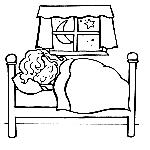

All too often, students coming
to my office with headaches or upset stomachs and no temperatures
are just over-tired. When they lie down to rest, they quickly
fall asleep. Upon awakening, they go back to class and function
well for the rest of the day.
Students need at least nine hours of sleep a night, and about 30 minutes of wind-down time before they go to bed. With busy days and evenings, it may be difficult to schedule that much sleep for your children.
Also, children who have televisions or computers in their rooms may get up again after they have gone to bed and begin watching TV or playing computer games. (They will often confess things to their school nurse that they wouldn't want to confess to their parents.) Siblings in the same bedroom can also cause sleep disturbances. Younger siblings may be restless, and older siblings may keep them awake past their bedtime.
Research shows that sleepy students perform worse in school and in sports, and are more prone to injuries than their well rested peers. Children who are sleep deprived can be irritable, easily frustrated, and hyperactive. Chronic lack of sleep can also be associated with some major health problems, including obesity and diabetes.
Please try to be sure your students get the full nine hours of sleep each school night. They will be happier, healthier, and better students.
Disclaimer: This information is not intended be a substitute for professional medical advice. It is provided for educational purposes only. You assume full responsibility for how you choose to use this information.
